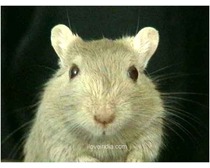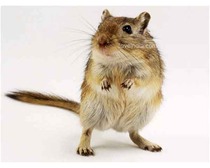There are several facts about gerbil which will surprise you. Read on to know all the interesting facts and amazing information on gerbils.
Facts About Gerbil
Gerbil is a small rodent, which is popularly reared as a pet by people. It is non-aggressive in nature and seldom bites, a quality that make it a favorite pet amongst many. There was a time when it was called “desert rat”, owing to its easy adaptability to arid habitats. In 19th century, it was first brought from China to Paris and France and consequently to the United States. In 1964, gerbil was introduced to the pet industry. It is found extensively throughout the hot arid regions of Asia and Africa. This social rodent prefers to live in groups and is happier if the group size is big. In this article, we bring you many more interesting facts and amazing information on gerbil.

Facts About Gerbil
Kingdom: Animalia
Phylum: Chordata
Class: Mammalia
Order: Rodentia
Family: Muridae
Subfamily: Gerbillinae
Body Length: 6-12 inches including the tail
Weight: 2 ½ ounce
Life Span: 2-3 years
Diet: Almost any plant items like sunflower seeds, peanuts, fruits, and vegetables, along with insects
Habit: Lives in big groups
Habitat: Dry deserts, Woodland savannas and rocky mountain slopes
Age of Sexual Maturity: Males: 12 months; Females: 20-24 months
Call: Squeal
Gestation Period: 21-26 days
Number of Offspring: 3-7
Interesting & Amazing Information On Gerbils
- The principal movement of gerbil is hopping, rather than running.
- Its whole body, including the tail, is covered with fur throughout, which helps it from getting sunburned.
- Gerbil is an expert digger and makes great burrows, where it can hide itself.
- It lives in groups and is extremely social in character. It is more comfortable in large groups.
- If gerbils do not find a group, they become frustrated and start attacking one another. Female gerbils are more likely to attack each other, than the male ones. However, in case there is a fight among the male gerbils, it is much more violent. A male gerbil rarely attacks a female gerbil.
- It is over inquisitive and curious by nature and is not easily startled.
- Gerbil is rather calm and quiet by nature. It does not become aggressive easily and harms only when it is threatened.
- It is usually silent and does not make sounds often. However, it squeals when it is alarmed by an approaching danger.
- When gerbil is frightened by a danger, it continuously thumps its back legs, which serves as the main signal for the other gerbils of the approaching danger.
- Gerbil can survive without water for a few days, if it has had enough moist food. However, in case of availability of water, it drinks in plenty.
- It does not take a water bath. Instead, it goes for sand bath. It can conveniently roll itself in the sand and get a shinier and smoother fur.
- Gerbil has a well adapted kidney, which produces minimum waste and conserves more fluid. This makes it a clean rodent, with little odor.
- It mates for several hours, which it does in frequent short bursts. The female allows itself to be chased frequently by the male, so that the latter catches it.
- The babies of gerbil are hairless, blind and deaf. In a week’s time, they get pigments on their skin, which marks the starting of fur growth.
- Gerbil is most commonly infected by Tyzzer’s disease, which has symptoms of lethargy, ruffled fur, poor appetite and hunched posture. Other common problems are diarrhea, tumors, ear problems and respiratory problems.
- It is a nocturnal creature, which is most active during the night time. It even has small limbs, making it a bad swimmer.
- There are differences between the various species of gerbil. Some have dark markings on the head, while others have white or buff patches on the back of the ear. Some gerbils may be moderately furred, while others may have no hair on the soles of the hind feet.
- Gerbils often sleep on top of each other and can unconsciously groom each other in their half-sleep.


See also
More from iloveindia.com
- Home Remedies | Ayurveda | Vastu | Yoga | Feng Shui | Tattoos | Fitness | Garden | Nutrition | Parenting | Bikes | Cars | Baby Care | Indian Weddings | Festivals | Party ideas | Horoscope 2015 | Pets | Finance | Figures of Speech | Hotels in India : Delhi | Hyderabad | Chennai | Mumbai | Kolkata | Bangalore | Ahmedabad | Jaipur
- Contact Us Careers Disclaimer Privacy Policy Advertise With Us Lifestyle Sitemap Copyright iloveindia.com. All Rights Reserved.




